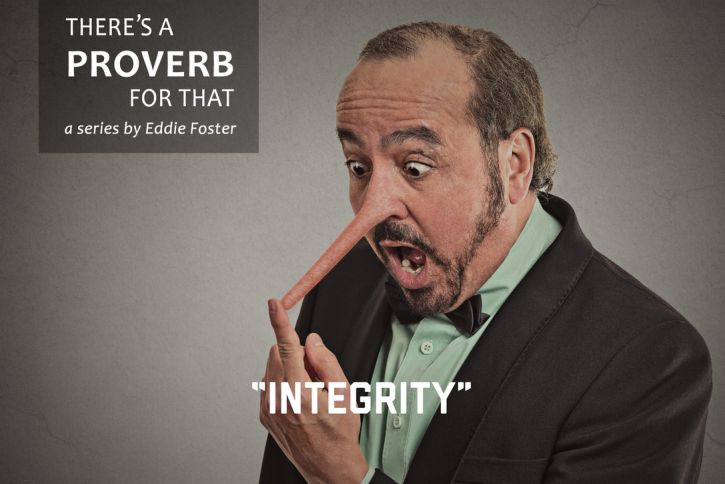There’s a Proverb for That: Integrity
If integrity is doing what’s right even when nobody’s looking, then this characteristic is sorely lacking in today’s world. How can the Proverbs help?

Liars, cheaters and robbers!
How often do we participate in, or see others participating in, the following:
- Taking advantage of others in order to advance ourselves?
- Lying on sales commissions, tax returns or about one’s own talents and abilities?
- Acting one way around some people and a completely different way around others?
The answer, by the way, is “too often.” Integrity is often seen as a hindrance to business, an annoyance to an individual and an old-fashioned quality of a bygone “good old days” era that never truly existed in the first place. But what is it really, and why do so many lack it today?
Integrity is always doing the right thing, at the right time, for the right reason.
Here is a simple definition: Integrity is always doing the right thing, at the right time, for the right reason. When enough people fail to follow this framework, the results are everything from con artists’ defrauding of senior citizens to porn stars’ making a mess of people’s lives.
The Bible acclaims integrity. It’s a trait that can preserve us (Psalm 25:21), and it’s a trait God will judge us by (Psalm 7:8). Proverbs has a lot to say about this topic. So, yes, there is a proverb for that.
Proverbs and implications
1. Proverbs 10:9: “He who walks with integrity walks securely, but he who perverts his ways will become known.”
As the saying goes: We can get away with some of the things some of the time, but we can’t get away with all of the things all of the time! Just ask the Wells Fargo employees who were caught creating false bank accounts, the charities that are shut down every year for inappropriately using donations, or the politicians who say things to get elected and then conveniently forget them after winning.
Another proverb mentions how integrity guides, but perversity destroys (Proverbs 11:3). The piper always comes calling, one way or another, and it is wise to be on the side of integrity when that happens.
Implications: Err on the side of integrity in every situation you come across. Tricky situations and ethical/moral dilemmas will arise often in our lives, and Christians should approach those times by trying to see the situation through God’s eyes. So we ask, “What would God want me to do here?” We can also bring this thinking down to the human level: “What would my mother think if she could see me doing this? What would people at Church and work think if they knew this is what I do in my free time?”
2. Proverbs 27:19: “As in water face reflects face, so a man’s heart reveals the man.”
Within the concept of integrity is the question of genuineness: Are we who we say we are? We all have weaknesses and areas to improve in our lives, but can others tell what our overall heart is like through our words and actions? Would we compromise our integrity for something as insignificant as a piece of bread (Proverbs 28:21)? Do we deceive or consistently practice righteousness (Proverbs 11:18)? Do we lurk secretly to attack and gain advantage over others (Proverbs 1:11, 18)? More importantly, do we avoid all these things all the time or just some of the time?
Implications: Be yourself. This doesn’t mean broadcasting all your weaknesses to everyone and saying anything that pops into your mind without tact or gentleness. It does mean that we should work hard to have a heart of integrity and to show that heart to others. We should make what we say consistent with what we do and who we are. God looks at the heart, not just at the mouth.
3. Proverbs 20:7: “The righteous man walks in his integrity; His children are blessed after him.”
We may not always think about it, but integrity can make a generational impact. When someone has integrity, the family is blessed because of it, making the community blessed, making the city blessed and so on. Donating money or setting up services for others are obvious examples. However, other Proverbs show that wealth is not a proof of integrity, since it is better to be poor and live with integrity (Proverbs 19:1) than to be a rich person who’s perverse in his or her ways (Proverbs 28:6).
Implications: We must strive to be an example of integrity to others around us—starting with our closest family. Be a person who avoids gossip, lewd joking, foul language, fudging timesheets and anything else that compromises integrity. Though we will make mistakes, we can show integrity in how we respond to, apologize for and grow from those mistakes.
Plenty more where those came from
We could write an unlimited number of blog posts on this subject, since integrity (in its many forms) is one of the greatest themes of the Bible. Many more nuggets of wisdom from this book add to the theme we have already seen: “Integrity is what keeps us from being phony, and the security and guidance it provides us can be passed on to future generations and society as whole.” When the atmosphere around us conflicts with God’s definition of integrity, remember there’s a proverb for that.
Building integrity is all about consistently making right choices. For further insight into how to make right choices, read “Decision Making: Seven Steps for Making Good, Christian Choices.”
Read the next blog post in this series: There’s a Proverb for That: “Aging—It’s Better Than the Alternative”
Date Posted: February 21, 2017

 by Eddie Foster
by Eddie Foster

